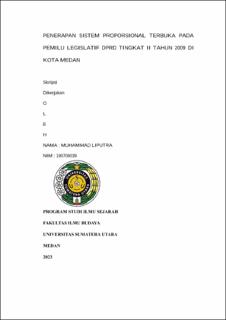| dc.description.abstract | The purpose of this research is to explain the application of the open list proportional system in the 2009 Regional Legislative Council Election of Medan City. In this research the author uses historical methods, namely herurisrik (collecting sources), verification (filtering sources), interpretation (study of sources), historiography (writing history). In collecting data, this research used two methods, namely literature study and field study. In the literature study that the author carried out was by collecting various library sources, namely at the North Sumatra Regional Library and the North Sumatera University Library. In the field study the author carried out was looking for sources from the Medan City KPU and the Waspada Newspaper Office, then conducting interviews with historical actors, in this case the implementers of the 2009 legislative elections, namely members of the 2009 Medan City KPU, members of the Medan City Panwaslu, election participants from the party that won the election, and the public as voters in the 2009 Legislative Election. Indonesia has held elections for quite a long time, namely 12 times since the Old Order era or 1955 until the last time in 2019. In holding elections in Indonesia, which have been going on for quite a long time, the Proportional Closed List system has always been used in its implementation, and in 2004 only implemented a relatively closed Open List system. The 1998 reforms gave Indonesia a mandate to become a more democratic country, and the 2009 elections were the moment to prove this. Elections are the method used by democratic countries to elect their leaders. Elections are a benchmark for democracy in modern democratic countries. The 2009 legislative elections by implementing the Open Proportional System were carried out well, even though they faced various problems, such as increasingly rapid money politics and other problems. In every election, the issue of the implementation system is always a debate among election participants. So this is quite interesting and important to discuss. In Medan City, the implementation of the Proportional Open List system in the 2009 Legislative Election went smoothly and faced many new challenges in the process of adapting to the new system. The results obtained in this research are that the implementation of the 2009 Legislative Election was indeed very democratic, where every element (all Legislative Candidates and parties) who played in the 2009 Election contest carried out serious campaigns, compared to 2004 which was already pessimistic about the serial numbers given by the parties. The winners or those who succeeded in qualifying for parliament in the 2009 elections were also very diverse, and were not only filled with Legislative Candidates (Legislative Candidates) who had low or top numbers, but also many who passed from lower or higher numbers, but were still dominated by Legislative Candidates who had serial numbers. top ones that made it through to parliament. The conclusion that can be drawn from this research is that the implementation of the 2009 elections was indeed very democratic, but there were still many shortcomings that must be corrected in the future. For example, the Open Proportional system gives all legislative candidates the opportunity to qualify for Parliament but also increases the money politics carried out by legislative candidates in winning the election. | en_US |




